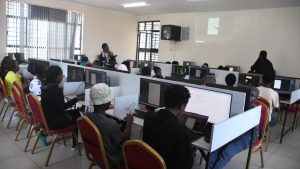By KNA
At the Ndumberi ICT Hub in Kiambu, 22-year-old Ken Mwai, a part-time DJ, is learning to market his talent online. With newly acquired skills in Photoshop, Canva, and web development, he now dreams of building his own digital brand.
A few desks away, 19-year-old Carlos Maina, who could not afford to join college after completing Form Four in 2024, is mastering web development, a path he sees as a stepping stone toward his dream of becoming an architectural engineer.
Their stories reflect a growing wave of digital empowerment sweeping across Kenya’s youth – one click, one skill at a time.
As part of the government’s Digital Superhighway and Jitume initiatives under the Bottom-Up Economic Transformation Agenda (BETA), the once quiet Ndumberi Youth Centre has been transformed into a vibrant ICT Hub, equipping young people with the digital skills needed to thrive in today’s technology-driven economy.
The Digital Superhighway, one of the flagship pillars of BETA, aims to expand broadband connectivity, promote digital skills, and create over one million jobs through ICT innovation and e-services. It focuses on extending fibre-optic infrastructure across the country, digitizing government services, and establishing community digital hubs like Ndumberi to nurture local talent and innovation.
The Ndumberi Hub is one of several established across Ting’ang’a, Riabai, Ndumberi, and Kiambu Township wards in Kiambu County. Through the Ajira and Jitume programmes, the centre offers free, government-certified training in transcription, graphic design, digital marketing, Forex trading, and web development. It also provides mentorship and a co-working space equipped with computers and reliable Wi-Fi connectivity.
At the heart of this transformation is Samuel Wainaina, the Centre Manager, who believes the hub is rewriting the future of Kiambu’s youth.
“If such an opportunity existed years back, many of our youth would have been much better. The digital world is moving fast, and companies will always want people who can manage their data,” he said.
Currently, 150 trainees are enrolled, including 54 pursuing ICT Stage 1, formerly known as computer packages. Two groups attend classes daily — one from 10 a.m. to 12 p.m. and another from 12 p.m. to 2 p.m. The three-month courses targets youth aged between 18 and 35 years residing in Kiambu Constituency, with registration open on weekdays.
Beyond training, participants are linked to NGOs, mentors, and companies in the digital economy — bridging the gap between learning and employment.
“These hubs really help us. They keep us away from drugs, theft, and idleness because, as the saying goes, an idle mind is the devil’s workshop,” said Ken, who now uses his new skills to design flyers and market his DJ services online.
For Carlos, the Hub offers a sense of direction. “At first, I felt stuck. But when I heard about the ICT Hub, I decided to try web development. It doesn’t mean I’ve abandoned my dream of becoming an architectural engineer — this is another skill I can use while planning my next step,” he said.
Since its establishment, the Ndumberi ICT Hub has trained over 300 young people, with some already earning income through online transcription, digital marketing, and virtual assistant jobs.
According to Aloysius Njoroge, the Constituency Office Manager under MP Machua Waithaka, the concept was inspired by a pilot model at the Kiambu Institute of Science and Technology.

“In 2023, 500 computers were distributed to the Ministry of ICT under the Jitume programme. Ndumberi Hub received its first 50 computers from Konza City. Currently, there are three fully operational centres across Kiambu,” he explained.
He added that the project continues to receive strong support from both the National Government Constituencies Development Fund (NG-CDF) and Konza Technopolis, which provide trainers, maintenance funds, mentorship, and capacity-building to ensure sustainability.
According to the Ajira Digital Programme, a flagship initiative of the Government of Kenya implemented through the Ministry of Information, Communications and the Digital Economy (MoICDE), significant progress has been made in expanding digital access and skills development across the country.
Nationally, more than 280 ICT hubs have been established out of the planned 1,450, ensuring that every ward will eventually host one. Through Ajira Digital and Jitume, over 390,000 youths have been trained, with 119,000 already linked to online work opportunities. Notably, 53 percent of the participants are young women — a major milestone in bridging gender gaps in the technology sector.
Kiambu MP Machua Waithaka lauded the initiative, saying it is transforming Kenya’s youth into global digital citizens. “The future belongs to those who can adapt to technology. These hubs are preparing our young people to become global competitors while creating opportunities right here at home,” said Machua.
The digital push aligns with the government’s broader goal to digitize over 5,000 public services, expand broadband access, and lay more than 100,000 kilometres of fibre-optic cable across the country. Plans are also underway to enhance internet stability and provide alternative power solutions to ensure uninterrupted learning in Kiambu’s hubs.
For trainees like Ken and Carlos, the Hub represents more than a learning space – it is a lifeline. It offers not just skills but also structure, purpose, and community. Ken even suggests that introducing indoor games would make the space more engaging, blending recreation with innovation.
The ripple effect is undeniable: every trainee leaves with a skill, a dream, and renewed hope. Together, they represent the future Kenya envisions under the Digital Superhighway – a nation where opportunity meets determination and digital innovation drives prosperity from the grassroots up.



